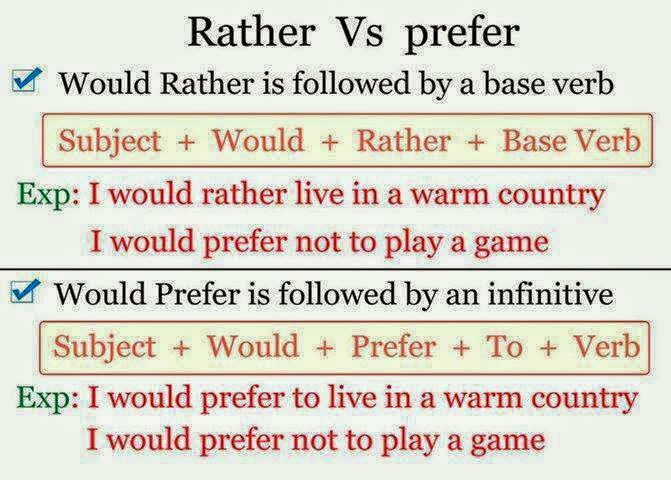Negative form for WOULD RATHER -- would rather + not + bare infinitive (verb1)
• I would rather not tell you.
• She would rather not eat.
• He would rather not go to work today.
Negative form for WOULD PREFER -- would prefer + not + infinitive (to + verb1)
• I would prefer not to play a game.
• They would prefer not to face the problem.
• She would prefer not to invite him.
Showing posts with label Vocabulary. Show all posts
Showing posts with label Vocabulary. Show all posts
Tuesday, March 11, 2014
Friday, January 17, 2014
Sunday, January 12, 2014
Travel - Trip - Journey - Tour - Voyage
The table below will help clarify the meaning and use of vocabulary related to travel.
Travel
|
The word 'travel' is used to talk about
going from one place to another.
It can be a verb, a noun or an adjective. ♦ verb : Tom travels a lot in his job. ♦ noun : Travel nowadays is faster and less expensive than before. ♦ adjective : There is a travel agency beside the bank. |
Trip
|
The word 'trip' is used to talk about a
short journey somewhere
for a purpose, business or pleasure. ♦ For our wedding anniversary, we went on a trip to Venice. ♦ My boss is often away on business trips. ♦ During our holiday, we took a boat trip to the islands. |
Journey
|
A journey is the distance covered in
travelling from one place to another.
'Journey' can refer to a long distance or a short regular one. ♦ The journey was long and tiring; it took us 5 hours to get there. ♦ Did you have a good journey? Yes, it was quite pleasant. ♦ How long is your journey to work? Just about 20 minutes. |
Tour
|
A tour is a journey
during which several places are visited,
especially on a holiday. The word 'tour' can be a noun or a verb. ♦ noun : We went on a tour of Italy. ♦ verb: We toured the north of India. |
Voyage
|
A voyage is a long
journey by sea or in space.
♦ Before the 20th century, long sea voyages were common. ♦ A spacecraft will take you on a voyage through space. |
Quiz: Journey, Travel & Trip
Like vs Alike
Like vs Alike
LIKE and ALIKE have similar meaning. Grammatically, LIKE is an adjective (standing before a noun) and ALIKE is a predicative adjective (as a art of a predicate and only standing at the end of the sentence).
Examples:
INCORRECT: Michelle and I have an alike hairstyle.
CORRECT: Our hairstyles are alike.
-- 'alike' is used to modify are, not hairstyle.
• Tom looks like Peter.
-- 'like' precedes a noun: Peter.
• We are very much alike.
• He looks like an actor.
• They look alike.
In a nutshell:
Use LIKE to mean "like someone else".
Use ALIKE to mean "like each other".
LIKE and ALIKE have similar meaning. Grammatically, LIKE is an adjective (standing before a noun) and ALIKE is a predicative adjective (as a art of a predicate and only standing at the end of the sentence).
Examples:
INCORRECT: Michelle and I have an alike hairstyle.
CORRECT: Our hairstyles are alike.
-- 'alike' is used to modify are, not hairstyle.
• Tom looks like Peter.
-- 'like' precedes a noun: Peter.
• We are very much alike.
• He looks like an actor.
• They look alike.
In a nutshell:
Use LIKE to mean "like someone else".
Use ALIKE to mean "like each other".
Thursday, December 19, 2013
Wednesday, December 18, 2013
Monday, December 16, 2013
Subscribe to:
Posts (Atom)











